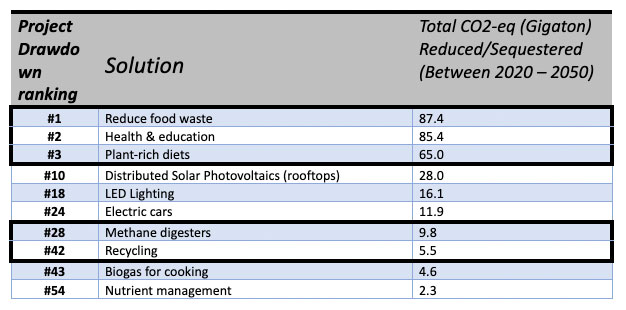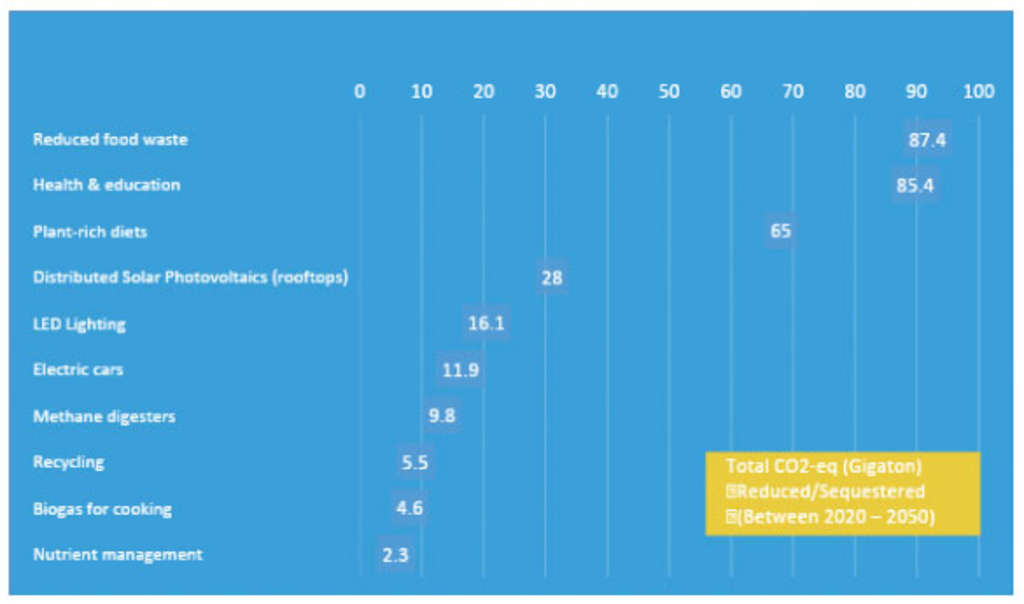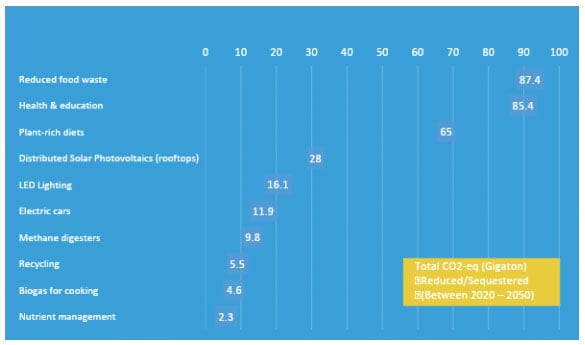10 most impactful sustainability actions the hotel industry (should) take the coming years
Traveling the world is a great way to experience new cultures, to adapt to new circumstances and to indulge in new tastes. For a hotelier, guest experience and providing impeccable service is of great importance to distinguish from others. But there is more than that.
Now, with the sustainability debate slowly reaching the greater mass, what most impactful measures should you take? How do you reach guests sharing these sustainability values? What is specifically convincing them to book with you?
Where sustainability and pampering guests may seem like a paradox, hotels can still offer the gestures they’ve come to expect, with sustainability goals in mind.
Focus on the biggest wins on reducing CO2 emissions.
Let’s first understand what actions have the biggest impact in reducing CO2 emissions that are applicable to the hospitality industry? For that, we looked at Project Drawdown, the world’s leading resource for climate solutions, seeking to help the world to reach “Drawdown”. This is the future point in time when levels of greenhouse gases (GHG) in the atmosphere stop climbing, and start to decline steadily. A Top 76 list shows where the biggest impacts in GHG reductions can be made (all backed up by scientific research). Of this list, we have selected 10 individual actions the hospitality industry specifically can (should) implement to support avoiding catastrophic warming of our atmosphere. This to avoid the devastating impact for many touristic destinations, and at the same time reducing operational costs.
10 main actions for the hospitality industry ranked by Project Drawdown.
#1: Reduce food waste: Ranked number one with the biggest impact when tackled globally. Around one third of all food produced globally is wasted or lost. This means that the emissions generated in the production phase were unnecessary and avoidable. Food waste we throw away with other waste, ends up in landfill emitting methane. This greenhouse gas is able to trap heat in our atmosphere 28 times stronger than CO2 does. The simplest action is to sort food waste at the source and transform it in an anaerobic digester into clean energy and natural fertilizer, replacing the polluting options.
#2: Health & education: When girls and young women have the ability to educate themselves, work and find a stable income thereby being empowered, fertility typically falls, which impacts the long-term population growth. The hospitality industry, often important for local employment, can support local communities by long-term job creation and job growth offerings, providing abilities to learn and to make informed healthy decisions, impacting local communities.
#3: Plant-rich diets: Strong reduction in global meat and dairy consumption is one of the most impactful things individuals can do to cut their carbon footprint, reduce global warming, to resolve antimicrobial resistance and stop the rise of other food-related diseases (such as the Coronavirus)), and prevent or reverse lifestyle diseases. Pro-active hotels will offer half of their menu items as plant-rich, showing CO2 emissions per item on the menu, thereby informing and nudging guests on their optimal choice, without always taking away the non-plant-based options. It is just presented differently. Hotels are ideal venues for guests to try new dietary options.
#10: Distributed solar photovoltaics (rooftops): Producing hyper-local, clean energy during daytime, for example on empty rooftops, show a visible way to produce clean energy and does not require land to place large scale solar fields. Even on cloudy days clean energy can be produced and co-power the hotel
#18: LED Lighting: Of all lightbulbs currently available on the market, LED is the most efficient one wasting the smallest amount of heat compared to other ways of lighting. With increasing energy prices, replacing lights to LED, a shorter payback time is reached and less energy is needed to be generated.
#24: Electric cars: Powering vehicles with electricity – locally and green produced – reduces the need for fossil fuels to generate electricity. Not every infrastructure around the world is already ready for this implementation, but good examples leading the way forward. Hotels can provide the charging infrastructure to guests and for their own electric vehicle pool.
#28: Methane digesters: Large industrial scale anaerobic digesters turn collected food waste into methane gas and digestate, a natural fertilizer. Transportation of food waste by diesel trucks to these large-scale digesters still emits greenhouse gases. Another solution is to process the food waste next to the hotel in an on-site anaerobic digester, co-powering the hotel with local green energy and reducing the (costly) need to store and transport the food waste. Add to that the replacement of artificial (fossil based) fertilizer by using food waste-based fertilizer to grow food in the hotel’s veggie gardens, hotels can reduce up to 5.11 KG CO2 per 1 KG food waste treated on-site. That is saving a lot more CO2 compared to asking guests to use their towel for a second time.
#42: Recycling: Reducing the need for raw virgin materials leads to lower emissions. Separation of all waste streams at the source, allows the hotel industry to recycle their waste streams, and enable local businesses to produce new products from these materials. Food waste tends to have the lowest contaminations, because it is fairly clear to understand what waste belongs to what bin.
#43: Biogas for cooking: Shifting energy sources from fossil to renewables sources, lead to lower CO2 emissions. On-site anaerobic digesters produce biogas and digestate fertilizer from available food waste. Biogas, once cleaned can be mixed with natural gas to cook on, or can be transformed into green electricity and heat for hot water.
#54: Nutrient management: Overuse of chemical nitrogen fertilizers, reduce the soils ability to store carbon, and lead to arid soils, impacting future food security. Local regenerative food production, fertilized by natural fertilizer coming from the same food waste, on the field or in vertical farms can lead to lower emissions and stable food supply, providing guests with local dishes, and at the same time supporting local regenerative farmers.
Grow your brand value through sustainability
Brand value is created by storytelling that resonates with your guest’s values, or that inspires them on subjects they have not thought about before. These sustainability stories needs to be reflected during the guest life cycle. These stories need to contribute to something bigger than guests thoughts about the hotel is only reducing his costs: From the moment guests are searching for an accommodation, the implemented actions and options are highlighted, distinguishing from the competition. In the accommodation, short stories, videos and photos are shown in de elevator and public toilets. In-room communication continues the story, providing more inspirational insights on the actions implemented, and asks the guest to help to support these actions. These stories reflect on how these sustainability actions impact the staff, the local environment and at the same time how the preferred suppliers are meeting these standards. Besides leisure guests becoming more aware on sustainable lifestyles, more corporate clients booking rooms need to report on their direct (Scope 1 and 2) and indirect emissions (Scope 3). Make this an advantage over competitors to be communicative and inspiring on how these indirect emissions are reduced at your hotel.
Sustainability as a guest experience
Turning sustainability into an experience in your property can become an even greater asset. Inhouse awareness training enables staff to breath the same story and provide insights on taken actions on what the hotel incorporates and values: Guests can be taken on a sustainability journey throughout the hotel; how the rooftop vegetable garden is fertilized by natural fertilizer from the hotel’s separated food waste. How green energy is produced on-site from food waste in an anaerobic digester, heating up the swimming pool water. And as a tours gift, guests are given a branded goody bag containing a local community product, such as a bar of soap, a plant-based recipe book with the restaurant’s signature dishes, and a small branded and storytelling bottle with plant food from the hotel’s food waste streams to energize guests’ plants and veggie garden back home.
Sustainable actions are becoming a carrier of brand value and their sustainable and social impact. Saving 5.11 kg CO2 per one kg food waste treated on-site is a huge saving, and when guests bring these sustainable habits back home, the positive impact becomes even bigger. This will allow the next generation to travel to beautiful places, to experience local tastes and being pampered in hotels sustainably.



